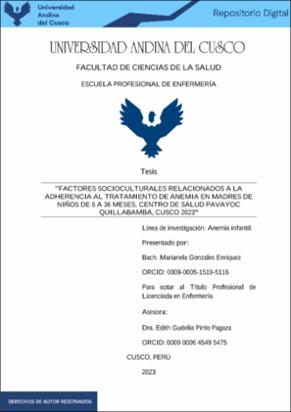| dc.contributor.advisor | Pinto Pagaza, Edith Gudelia | |
| dc.contributor.author | Gonzales Enriquez, Marianela | |
| dc.date.accessioned | 2023-10-09T20:43:38Z | |
| dc.date.available | 2023-10-09T20:43:38Z | |
| dc.date.issued | 2023-06-22 | |
| dc.identifier.uri | https://hdl.handle.net/20.500.12557/5756 | |
| dc.description.abstract | El presente trabajo de investigación titulado: “FACTORES SOCIOCULTURALES
RELACIONADOS A LA ADHERENCIA AL TRATAMIENTO DE ANEMIA EN
MADRES DE NIÑOS DE 6 A 36 MESES, CENTRO DE SALUD PAVAYOC
QUILLABAMBA, CUSCO 2023” tuvo como objetivo determinar la relación entre los
factores socioculturales y la adherencia al tratamiento de anemia en madres de niños de 6 a
36 meses, Centro de Salud de Pavayoc Quillabamba, Cusco; la metodología fue de enfoque
cuantitativo, de alcance correlacional, diseño no experimental y transversal, la muestra
estuvo constituida por 96 madres de niños de 6 a 36 meses, aplicando un cuestionario
estructurado.
Como resultados se halló dentro de los factores sociales que 40,6% de las madres de niños
presentan edades de 31 a 35años, 64,6% perciben un ingreso entre 1001 a 1500 soles, 66,7%
es conviviente, 76,0% tienen de 2 a 3 hijos, 49,0% tiene vivienda propia, 49,0% es ama de
casa y 60,4% tiene grado de instrucción de secundaria. En los factores culturales 77,1% son
católicos, 89,6% tiene como único idioma al español, 65,6% confía en la efectividad de la
suplementación y 63,5% procede de la zona urbana.
La relación entre los factores sociales: ocupación (p=0,003) y grado de instrucción
(p=0,047) con la adherencia al tratamiento de la anemia lo que significa que la ocupación a
la que se dedica la madre y su grado de instrucción repercute en la adherencia al tratamiento
de anemia que presentan sus hijos, por el contrario no se halló relación para: la edad, estado
civil, número total de hijos y tenencia de vivienda. Con relación a los factores culturales se
halló relación con el idioma (p=0,009), confianza en la efectividad de la suplementación
(p=0,030) y lugar de procedencia (p=0,015) con la adherencia al tratamiento, denotando que
el idioma que hablan las madres, su confianza hacia la suplementación y el lugar de donde
provienen está relacionado a la adherencia al tratamiento de sus hijos. | es_PE |
| dc.description.abstract | The present research work titled: "SOCIOCULTURAL FACTORS RELATED TO THE
ADHERENCE TO ANEMIA TREATMENT IN MOTHERS OF CHILDREN FROM 6 TO
36 MONTHS, PAVAYOC QUILLABAMBA HEALTH CENTER, CUSCO 2023" aimed
to determine the relationship between sociocultural factors and adherence to anemia
treatment in mothers of children aged 6 to 36 months at the Pavayoc Quillabamba Health
Center, Cusco. The methodology employed was quantitative in focus, with a correlational
scope, a non-experimental and cross-sectional design. The sample was composed of 96
mothers of children aged 6 to 36 months, and a structured instrument was applied.
The results found that among the social factors, 40.6% of the mothers of the children are
aged 31 to 35, 64.6% perceive an income between 1001 to 1500 soles, 66.7% cohabitate,
76.0% have 2 to 3 children, 49.0% own their homes, 49.0% are homemakers, and 60.4%
have a secondary level of education. Regarding the cultural factors, 77.1% are Catholics,
89.6% speak only Spanish, 65.6% trust in the effectiveness of supplementation, and 63.5%
come from urban areas.
A relationship was found between social factors: occupation (p=0.003) and educational level
(p=0.047) with adherence to anemia treatment, meaning that the occupation of the mother
and her level of education impact the adherence to anemia treatment in their children.
Conversely, no relationship was found for age, marital status, total number of children, and
home ownership. Regarding the cultural factors, a relationship was found with the language
(p=0.009), trust in the effectiveness of the supplementation (p=0.030), and place of origin
(p=0.015) with the adherence to treatment, indicating that the language spoken by the
mothers, their trust towards supplementation, and their place of origin are related to the
adherence to their children's treatment. | en_US |
| dc.format | application/pdf | es_PE |
| dc.language.iso | spa | es_PE |
| dc.publisher | Universidad Andina del Cusco | es_PE |
| dc.rights | info:eu-repo/semantics/openAccess | es_PE |
| dc.rights.uri | https://creativecommons.org/licenses/by-nc-nd/4.0/ | es_PE |
| dc.subject | Adherencia al tratamiento | es_PE |
| dc.subject | Factores socioculturales | es_PE |
| dc.subject | Anemia | es_PE |
| dc.title | Factores socioculturales relacionados a la adherencia al tratamiento de anemia en madres de niños de 6 a 36 meses, Centro de Salud Pavayoc Quillabamba, Cusco 2023 | es_PE |
| dc.type | info:eu-repo/semantics/bachelorThesis | es_PE |
| thesis.degree.name | Licenciada en Enfermería | es_PE |
| thesis.degree.grantor | Universidad Andina del Cusco. Facultad de Ciencias de la Salud | es_PE |
| thesis.degree.discipline | Enfermería | es_PE |
| dc.publisher.country | PE | es_PE |
| dc.subject.ocde | https://purl.org/pe-repo/ocde/ford#3.03.03 | es_PE |
| renati.advisor.dni | 23985215 | |
| renati.advisor.orcid | https://orcid.org/0009-0006-4549-5475 | es_PE |
| renati.author.dni | 25013735 | |
| renati.discipline | 913016 | es_PE |
| renati.juror | Chihuantito Abal, Luis Alberto | |
| renati.juror | Caballero Aparicio, Sdenka | |
| renati.juror | Rojas Pariona, Carmen Rosa | |
| renati.juror | Valencia García, Julio Cesar | |
| renati.level | https://purl.org/pe-repo/renati/level#tituloProfesional | es_PE |
| renati.type | https://purl.org/pe-repo/renati/type#tesis | es_PE |
| dc.description.lineadeinvestigacion | Anemia infantil | es_PE |




